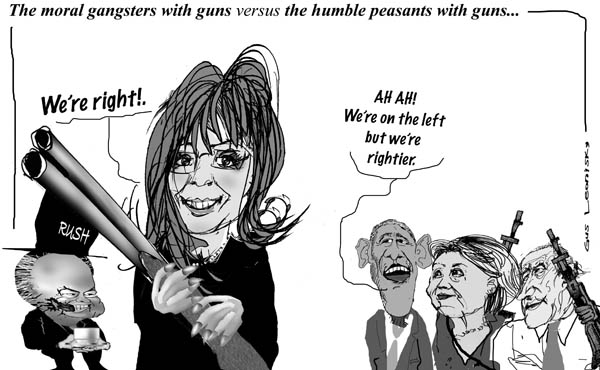Search
Recent comments
- more polling....
44 min 45 sec ago - they know....
3 hours 35 min ago - past readings....
4 hours 34 min ago - jihadist bob.....
4 hours 40 min ago - macronicon.....
6 hours 35 min ago - fascist liberals....
6 hours 36 min ago - china
10 hours 10 min ago - google bias...
1 day 2 hours ago - other games....
1 day 2 hours ago - נקמה (revenge)....
1 day 3 hours ago
Democracy Links
Member's Off-site Blogs
tweedleright verus righttweedle

Gerard Alexander: Why are liberals [US democrats mostly] so condescending?
Every political community includes some members who insist that their side has all the answers and that their adversaries are idiots. But American liberals, to a degree far surpassing conservatives, appear committed to the proposition that their views are correct, self-evident, and based on fact and reason, while conservative positions are not just wrong but illegitimate, ideological and unworthy of serious consideration. Indeed, all the appeals to bipartisanship notwithstanding, President Obama and other leading liberal voices have joined in a chorus of intellectual condescension.
It's an odd time for liberals to feel smug. But even with Democratic fortunes on the wane, leading liberals insist that they have almost nothing to learn from conservatives. Many Democrats describe their troubles simply as a PR challenge, a combination of conservative misinformation -- as when Obama charges that critics of health-care reform are peddling fake fears of a "Bolshevik plot" -- and the country's failure to grasp great liberal accomplishments. "We were so busy just getting stuff done . . . that I think we lost some of that sense of speaking directly to the American people about what their core values are," the president told ABC's George Stephanopoulos in a recent interview. The benighted public is either uncomprehending or deliberately misinformed (by conservatives).
This condescension is part of a liberal tradition that for generations has impoverished American debates over the economy, society and the functions of government -- and threatens to do so again today, when dialogue would be more valuable than ever.
Liberals have dismissed conservative thinking for decades, a tendency encapsulated by Lionel Trilling's 1950 remark that conservatives do not "express themselves in ideas but only in action or in irritable mental gestures which seek to resemble ideas." During the 1950s and '60s, liberals trivialized the nascent conservative movement. Prominent studies and journalistic accounts of right-wing politics at the time stressed paranoia, intolerance and insecurity, rendering conservative thought more a psychiatric disorder than a rival. In 1962, Richard Hofstadter referred to "the Manichaean style of thought, the apocalyptic tendencies, the love of mystification, the intolerance of compromise that are observable in the right-wing mind."
This sense of liberal intellectual superiority dropped off during the economic woes of the 1970s and the Reagan boom of the 1980s.
-----------------
Gus: there is ample room for confusion with words such as liberals, democrats, republicans, conservatives because, for example, the term Liberal is used in Australia to denote the "conservatives" while the term republicans denotes those who are opposed to royalty (the queen of Pommyland presently "influencing" Aussie politics by default). In Australia the term Labor is used to emulate the equivalent of a "democrat" but Labor claims to be a bit more to the left (socialist), tooting more "social justice" tendencies, that is to say, trying to redress the inequalities from the unfortunate vagaries of birth, while the Liberals (conservatives who are more like the Republicans in the US, but with strong royalist tendencies) tend to favor the great GREED voodoo with a redeeming factor of tax deductible godly charity.
All in all, politics in these two countries are a bit like the humble peasants versus the moral gansters, all with guns to shoot anything that moves, fighting it out in elections that only shift the origin of the same blancmange of populace fodder — us..
In Australia both side are condescending by using populist policies designed to impress with little results. Those on the right, the Liberals are often more annoying — usually helping the rich survive better so the charity can be more generously condescending...
- By Gus Leonisky at 8 Feb 2010 - 9:53am
- Gus Leonisky's blog
- Login or register to post comments
shut the door please...
In an interview recorded Saturday and broadcast on "FOX News Sunday," Palin said she would run "if I believed that that is the right thing to do for our country and for the Palin family."
"I think that it would be absurd to not consider what it is that I can potentially do to help our country," Palin said, later adding: "I won't close the door that perhaps could be open for me in the future."
The interview was recorded before her keynote address Saturday night at what was billed the first national Tea Party convention. Palin, who had little national profile before running unsuccessfully for vice president on Sen. John McCain's Republican ticket in 2008, remains a leading GOP draw and an unofficial symbol of the Tea Party movement of conservative discontent with government.
--------------------------
See toon at top...